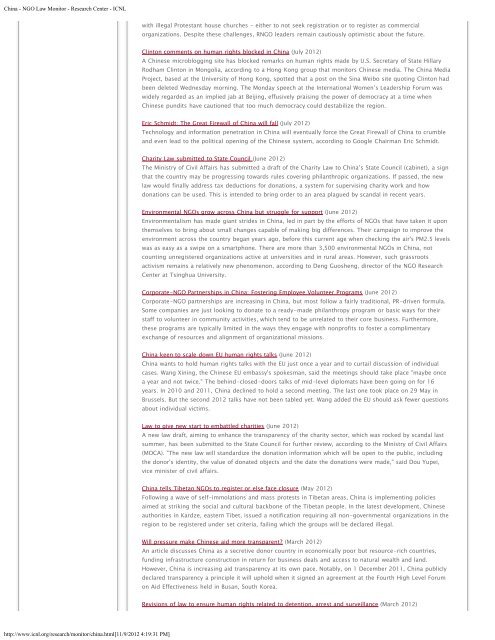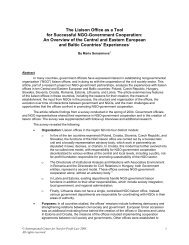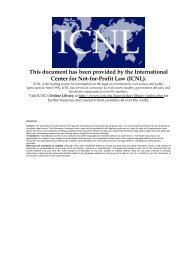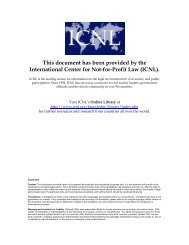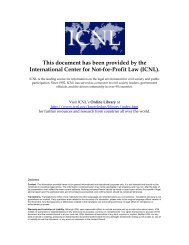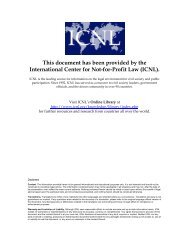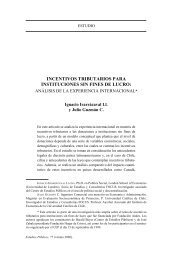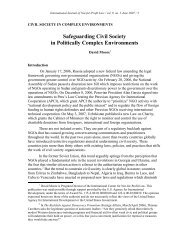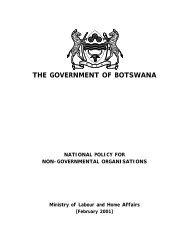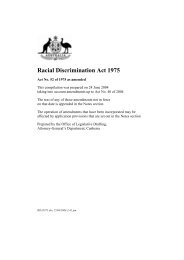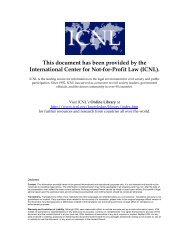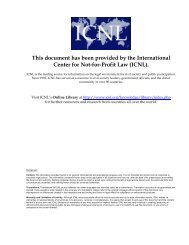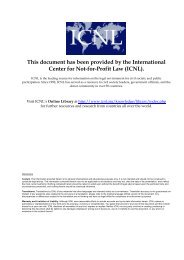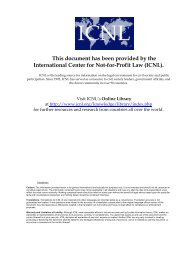NGO Law Monitor: China RESEARCH CENTER - The International ...
NGO Law Monitor: China RESEARCH CENTER - The International ...
NGO Law Monitor: China RESEARCH CENTER - The International ...
You also want an ePaper? Increase the reach of your titles
YUMPU automatically turns print PDFs into web optimized ePapers that Google loves.
<strong>China</strong> - <strong>NGO</strong> <strong>Law</strong> <strong>Monitor</strong> - Research Center - ICNL<br />
http://www.icnl.org/research/monitor/china.html[11/9/2012 4:19:31 PM]<br />
with illegal Protestant house churches - either to not seek registration or to register as commercial<br />
organizations. Despite these challenges, R<strong>NGO</strong> leaders remain cautiously optimistic about the future.<br />
Clinton comments on human rights blocked in <strong>China</strong> (July 2012)<br />
A Chinese microblogging site has blocked remarks on human rights made by U.S. Secretary of State Hillary<br />
Rodham Clinton in Mongolia, according to a Hong Kong group that monitors Chinese media. <strong>The</strong> <strong>China</strong> Media<br />
Project, based at the University of Hong Kong, spotted that a post on the Sina Weibo site quoting Clinton had<br />
been deleted Wednesday morning. <strong>The</strong> Monday speech at the <strong>International</strong> Women’s Leadership Forum was<br />
widely regarded as an implied jab at Beijing, effusively praising the power of democracy at a time when<br />
Chinese pundits have cautioned that too much democracy could destabilize the region.<br />
Eric Schmidt: <strong>The</strong> Great Firewall of <strong>China</strong> will fall (July 2012)<br />
Technology and information penetration in <strong>China</strong> will eventually force the Great Firewall of <strong>China</strong> to crumble<br />
and even lead to the political opening of the Chinese system, according to Google Chairman Eric Schmidt.<br />
Charity <strong>Law</strong> submitted to State Council (June 2012)<br />
<strong>The</strong> Ministry of Civil Affairs has submitted a draft of the Charity <strong>Law</strong> to <strong>China</strong>’s State Council (cabinet), a sign<br />
that the country may be progressing towards rules covering philanthropic organizations. If passed, the new<br />
law would finally address tax deductions for donations, a system for supervising charity work and how<br />
donations can be used. This is intended to bring order to an area plagued by scandal in recent years.<br />
Environmental <strong>NGO</strong>s grow across <strong>China</strong> but struggle for support (June 2012)<br />
Environmentalism has made giant strides in <strong>China</strong>, led in part by the efforts of <strong>NGO</strong>s that have taken it upon<br />
themselves to bring about small changes capable of making big differences. <strong>The</strong>ir campaign to improve the<br />
environment across the country began years ago, before this current age when checking the air's PM2.5 levels<br />
was as easy as a swipe on a smartphone. <strong>The</strong>re are more than 3,500 environmental <strong>NGO</strong>s in <strong>China</strong>, not<br />
counting unregistered organizations active at universities and in rural areas. However, such grassroots<br />
activism remains a relatively new phenomenon, according to Deng Guosheng, director of the <strong>NGO</strong> Research<br />
Center at Tsinghua University.<br />
Corporate-<strong>NGO</strong> Partnerships in <strong>China</strong>: Fostering Employee Volunteer Programs (June 2012)<br />
Corporate-<strong>NGO</strong> partnerships are increasing in <strong>China</strong>, but most follow a fairly traditional, PR-driven formula.<br />
Some companies are just looking to donate to a ready-made philanthropy program or basic ways for their<br />
staff to volunteer in community activities, which tend to be unrelated to their core business. Furthermore,<br />
these programs are typically limited in the ways they engage with nonprofits to foster a complimentary<br />
exchange of resources and alignment of organizational missions.<br />
<strong>China</strong> keen to scale down EU human rights talks (June 2012)<br />
<strong>China</strong> wants to hold human rights talks with the EU just once a year and to curtail discussion of individual<br />
cases. Wang Xining, the Chinese EU embassy's spokesman, said the meetings should take place "maybe once<br />
a year and not twice." <strong>The</strong> behind-closed-doors talks of mid-level diplomats have been going on for 16<br />
years. In 2010 and 2011, <strong>China</strong> declined to hold a second meeting. <strong>The</strong> last one took place on 29 May in<br />
Brussels. But the second 2012 talks have not been tabled yet. Wang added the EU should ask fewer questions<br />
about individual victims.<br />
<strong>Law</strong> to give new start to embattled charities (June 2012)<br />
A new law draft, aiming to enhance the transparency of the charity sector, which was rocked by scandal last<br />
summer, has been submitted to the State Council for further review, according to the Ministry of Civil Affairs<br />
(MOCA). "<strong>The</strong> new law will standardize the donation information which will be open to the public, including<br />
the donor's identity, the value of donated objects and the date the donations were made," said Dou Yupei,<br />
vice minister of civil affairs.<br />
<strong>China</strong> tells Tibetan <strong>NGO</strong>s to register or else face closure (May 2012)<br />
Following a wave of self-immolations and mass protests in Tibetan areas, <strong>China</strong> is implementing policies<br />
aimed at striking the social and cultural backbone of the Tibetan people. In the latest development, Chinese<br />
authorities in Kardze, eastern Tibet, issued a notification requiring all non-governmental organizations in the<br />
region to be registered under set criteria, failing which the groups will be declared illegal.<br />
Will pressure make Chinese aid more transparent? (March 2012)<br />
An article discusses <strong>China</strong> as a secretive donor country in economically poor but resource-rich countries,<br />
funding infrastructure construction in return for business deals and access to natural wealth and land.<br />
However, <strong>China</strong> is increasing aid transparency at its own pace. Notably, on 1 December 2011, <strong>China</strong> publicly<br />
declared transparency a principle it will uphold when it signed an agreement at the Fourth High Level Forum<br />
on Aid Effectiveness held in Busan, South Korea.<br />
Revisions of law to ensure human rights related to detention, arrest and surveillance (March 2012)


